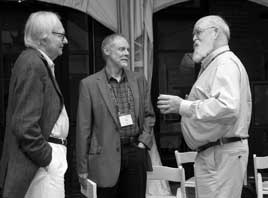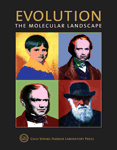|
LXXIV: EVOLUTION The Molecular Landscape 2009 |
|
|

|
James Darnell, John Inglis & Daniel Dennett SYMPOSIUM SYNOPSIS LIST OF PARTICIPANTS CONTENTS OF SYMPOSIUM VOLUME PHOTOGRAPHS PUBLISHED VOLUME PRESENTER INTERVIEWS  |
EVOLUTION The Molecular Landscape
May 27 - June 2, 2009
Symposium Synopsis
Meeting Organized by Bruce Stillman, David Stewart, and Jan Witkowski
The 74th Cold Spring Harbor Laboratory Symposium on Quantitative Biology on Evolution: The Molecular Landscape was dedicated to Charles Darwin on the occasion of the bicentennial of his birth and the 150th anniversary of the publication of On the Origin of Species. The Laboratory celebrated the 100th anniversary in 1959 with its 24th Symposium on Genetics and Twentieth Century Darwinism. What was entirely absent from that Symposium and what dominated the Symposium 50 years later are the contributions molecular biology has made to our understanding of evolution. Even as the details of Darwin's ideas have been modified over the years, evidence from molecular studies has strengthened his fundamental thesis.
The 2009 Symposium set out to examine the current state of many of the ideas that Darwin developed in his four great books: On the Origin of Species by Means of Natural Selection, The Variation of Animals and Plants Under Domestication, The Descent of Man and Selection in Relation to Sex, and The Expression of Emotions in Man and Animals. Leading investigators were invited to present their latest research in a diversity of fields ranging from the origins of life (unicellular and multicellular) to speciation and domestication to the evolutionary basis of human attributes. An overarching theme of the meeting was the extent to which much of evolutionary biology can now be viewed in a molecular, and often genomic, framework and the extraordinary degree to which many of Darwin's insights remain profoundly relevant today.
The Symposium included two rather unusual sessions. Evolutionary concepts have had an impact far beyond the boundaries of science and there is hardly a field of human endeavor that has not been influenced by evolutionary thinking. To acknowledge this contribution of Darwin, there was a session on "Cultural Evolution" that included presentations on principles of natural selection applied to linguistics, ideas, and economics by, respectively, Daniel Dennett, Matt Ridley, and Niall Ferguson. In the second unusual session, "Evolution and the Public," Kevin Padian, Ken Miller, Barbara Forrest, and Eugenie Scott discussed socalled "intelligent design" and the threat such irrational and antiscientific attitudes pose to education in the United States and elsewhere.
In arranging this Symposium, the organizers were dependent on the guidance of a broad cadre of advisors including Drs. Nicholas Barton, Hans Ellegren, Claire Fraser-Liggett, David Haussler, Gerry Joyce, Susan McCouch, Sarah Otto, Svante Pääbo, Nipam Patel, Matt Ridley, James D. Watson, and Richard Wrangham. Opening night speakers included Janet Browne, Ed Wilson, David Kingsley, and Marc Hauser. Douglas Wallace presented the Reginald Harris Lecture on "Energetics in Eukaryotic and Human Origins." Kevin Padian enlightened a mixed audience of scientists and lay friends and neighbors with his Dorcas Cummings Lecture on "Darwin, Dover, & Intelligent Design," and Brian Charlesworth ended the meeting with a masterful and thought-provoking summary.
This Symposium was held May 27–June 1 and attended by 400 scientists from more than 25 countries. The program included 69 invited presentations and more than 175 poster presentations. For the first time, six Symposium fellows were selected from the submitted abstracts, and each of these young scientists gave a short research presentation.
We thank Val Pakaluk and Mary Smith in the Meetings and Courses Program Office for their assistance in organizing and running the meeting and John Inglis and his staff at Cold Spring Harbor Laboratory Press, particularly Joan Ebert, Rena Steuer, and Kathy Bubbeo, for publishing both the printed and online versions of the Symposium proceedings. Photographers Connie Brukin and Jan Witkowski captured candid snapshots throughout the Symposium, and artist Julia Kuhl sketched portraits of a number of the speakers. Funds to support this meeting were obtained from the National Institutes of Health. Financial support from the corporate benefactors, sponsors, affiliates, and contributors of our meetings program is essential for these Symposia to remain a success and we are most grateful for their continued support.
Bruce Stillman
David Stewart
Jan Witkowski
March 2010
Search images: